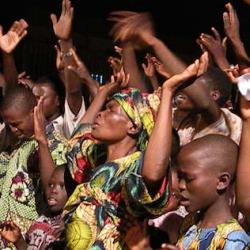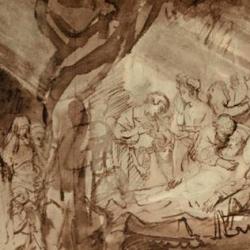Here’s another sermon outline, again shamelessly borrowing material from Jim Jordan ‘s From Bread to Wine .
Priestly Service, 1 Kings 4:1-20
INTRODUCTION
Priests are servants in a royal household. They live to serve their master, and they are regulated by detailed rules and regulations. The priestly stage of life is the first stage of maturity.
THE TEXT
?Now King Solomon was king over all Israel. And these were his officials: Azariah the son of Zadok was the priest; Elihoreph and Ahijah, the sons of Shisha were secretaries . . . .?E(1 Kings 4:1-20).
?SECULAR?EPRIESTS
We can move toward a more comprehensive definition of the meaning of priesthood by examining the few secular uses of the word “priest” in the Old Testament. In the list of ministers of Solomon in 1 Kings 4:5, we are told that “Zabud the son of Nathan, a priest, [was] the king’s friend.” By this time, Solomon had already deposed Abiathar as high priest, in fulfillment of the word of the Lord against Eli (1 King 2:26-27), and Zadok, the priest who helped Solomon reach the throne, was Abiathar’s replacement (1 Kings 1:32-40; 2:35).
In 1 Kings 4:5, “king’s friend” and “priest” are possibly parallel terms. What is a “king’s friend”? In 2 Samuel 15:37 and 16:16, Hushai the Archite is called “David’s friend.” His activities during Absalom’s rebellion indicate the functions of this office. After Absalom had taken Jerusalem and David had fled, David asked Hushai to return to Jerusalem to confound the counsel of Ahitophel. David told Hushai to identify himself as David’s “servant” (16:19). When Absalom asked Hushai why he was abandoning David, his “friend,” Hushai answered that he would serve in the presence of Absalom as he served in the presence of David (16:19). Hushai later gave advice to Absalom (17:5-14). Hushai, the friend of David, was privy to all of David’s activities, and was even allowed to give counsel to the king. The word ?priest?Eis also used in 2 Samuel 8:18, where we are told that David’s sons were priests. Verse 17 enumerates the leading Aaronic priests, Zadok and Ahimelech, which shows that David?s sons were ?priests?Ein some other sense.
PRIESTS AS YAHWEH?S SERVANTS
Several passages explicitly call priests “servants” or “ministers” of the Lord’s house. In Psalm 134, the priests are called “servants of the Lord.” In Joel 1:9 and 2:17, priests are called “servants of the Lord,?Eand in 1:13 “servants of the altar” and “servants of my God.?E Priests are said to ?serve?Ein the holy place (Exodus 35:19; 39:41) and “before the Lord” (1 Samuel 2:11). Nehemiah 10:39 speaks of “priests who are ministering,” and Deuteronomy 18:3-5 describes priests as officials designated “to stand and serve in the name of the Lord.” Ezra 8:17 uses the phrase “ministers for the house of our God,” and the Lord addresses the priests as “My ministers” (Jeremiah 33:21).
As Yahweh?s servants, priests had a number of specific duties. First, they performed table service for Yahweh, placing His meals on the altar morning and evening. Second, they were responsible for guarding Yahweh?s house, keeping out unwanted intruders (Numbers 1:53). Third, they had to keep the house clean by sprinkling blood on the furnishings of the house.
As noted last week, all this was performed in accord with strict and detailed rules. The rituals for sacrifice were laid out at length (Leviticus 1-7, 16), and rules of judging and dealing with uncleanness were also laid out (Leviticus 12-15). Priests had to dress and conduct themselves differently from the rest of Israel (Leviticus 21-22), and the duties of the various groups of Levites were spelled out (Numbers 3-4).
THE PRIESTLY STAGE OF LIFE
In one sense, childhood is a priestly stage of life. Children are under close rules and regulations, and children are expected to do what they are told. From another perspective, the priestly stage is the first stage of adult life, when you are learning a trade, responding to a calling, and often establishing a household. In this sense, as you enter the priestly stage of life, you break with childhood and the home of your childhood. You enter priestly service by leaving home.
We can see this transition in a number of biblical stories. Adam was created as God?s son (Luke 3:38), and was given a task in the garden. But he entered a new phase of life when Yahweh put him into ?deep sleep,?Etore out a rib, and built a woman (Genesis 2:18-25). Then Yahweh left Adam to guard Eve on his own (cf. 3:8). Adam left his ?Father?Eand cleaved to his wife (2:24). It was then that he faced his first great challenge, which he of course failed.
Jacob?s story is much more complex, but there is a similar pattern. He has various conflicts in his home (Genesis 25-27), and eventually flees from his father?s house. When he arrives at Laban?s home, he takes Rachel and Leah as wives (Genesis 29), and has to face continuous cheating and oppression from Laban (Genesis 31:36-42). Despite Laban?s mistreatment, Jacob is a faithful servant who prospers far more than his boss.
David goes through a similar process of maturing. He has to face various challenges as a boy, including the battle with Goliath (1 Samuel 17). Once he has passed those early tests, he enters into Saul?s service (he ?stood before?ESaul, which is priestly language, 16:21), leaving Jesse?s home. He is marries the king?s daughter a short time later (18:20-30). Saul, like Laban, was an unjust master, who tried to kill David more than once (18:10-11; 19:8-10). David remained faithful as a priest to Saul, and eventually inherited the kingdom.
BECOMING PRIESTS
There are a number of specific sins that those in the priestly stage of life need to avoid. These apply specifically to the young people, especially the young men, in our congregation. First, there is the ever-present danger of pride, of thinking of yourself more highly than you ought. College students especially are prone to this temptation; they read a few books, learn how to throw around a few terms, and they think they know a lot. Don?t be fooled. You don?t know much of anything. A second, related problem is that young men often think they can get along quite well without any oversight, guidance, or contact with older men. This again is folly. You need the counsel of elders, parents, and other guides if you are going to move into the next phase of life. To you older men of the congregation: You need to make every effort to get to know the young men here, so that you can assist them toward maturity.
Another of the dangers is to remain in childhood when you need to move on and put away childish things. You should be using your ?early priestly?Elife as an opportunity to develop the skills and habits that will enable you to prosper in a job, a marriage, and in the later stages when you are given more royal responsibilities. We all know that this frequently doesn?t happen. College life becomes a way of perpetuating childhood for four more years.
The big transition into priestly life takes place in leaving home, which occurs most obviously and dramatically in marriage. There are temptations on both sides. One is that you only pretend to leave home, but you still remain completely dependent on your parents for everything. This perpetuates childhood. To mature, you need to go through the ?death?Eor ?deep sleep?Eof leaving home. The other temptation is to leave home and cut loose. You ignore your parents?Ecounsel and forget a
ll the rules they have taught you.















